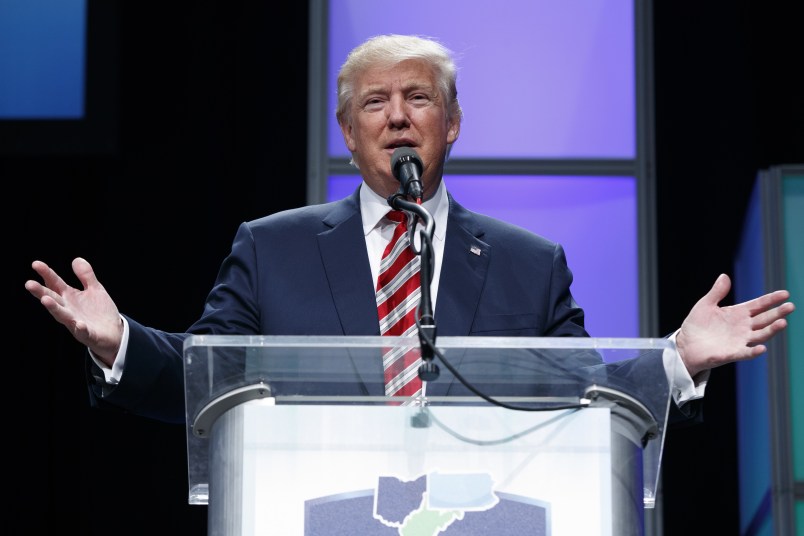We’re still piecing the details of David Fahrenthold’s latest story at the Post. But this seems like by far his biggest get yet. He appears to have caught Trump in major tax evasion using his charity. Tax evasion on the back end, self-dealing on the front. That makes the whole entity look like a tax dodge.
Let me jump through the outline details.
Last week we noted that a Trump family aide defended the idea that Trump Foundation money is really Trump’s money since often he takes money that’s owed to him and directs it to the Foundation. That’s laudable if true. But it’s irrelevant in terms of whose money it is. Once Trump gives money to his Foundation it’s the Foundation’s money and all those rules apply.
Now it turns out that a lot of the Foundation money does come in just this way. But here’s the key. It sounds like Trump is not paying taxes on that income.
It works like this. Trump or one of his businesses is owed money by Company X or Person Y. Trump says ‘Don’t send the check to me. Just send it to my Foundation.’ No problem with that. As I said, as long as your foundation is legit, it’s laudable. But you have to pay taxes on that money because it’s your income.
Here’s where it gets weird. Fahrenthold got a series of false explanations from Trump representative Boris Epshteyn about how this money was handled. When Fahrenthold presented Epshteyn with proof of these diversions, Epshteyn shifted gears and said the diversions did happen but they were fine.
At this point, Epshteyn cited an 1942 tax case which seems not to apply to the facts in Trump’s case. Here’s that passage in the Post’s piece …
Instead, Epshteyn put forward a different explanation. Trump, he said, had never done what Patton described.
Instead, Epshteyn said, Trump had all along been following the dictates of an obscure 1942 court case, which he cited by name: Commissioner of Internal Revenue v. Giannini.
That case involved a San Francisco bank president who had decided he had been paid enough and renounced the rest of his salary for the year. The bank gave his money to the University of California instead. The court held that the bank president didn’t have to pay taxes on that money, because he hadn’t controlled where it went.
Trump, Epshteyn said, was just like that. He had not exercised control over where his money went. Indeed, Epshteyn said, when Trump helped someone, he never asked specifically for a gift to the Donald J. Trump Foundation — but rather suggested a gift to some charity, somewhere.
But sometimes, Epshteyn said, a gift arrived at the Trump Foundation.
“He’s Donald J. Trump,” Epshteyn said, explaining why donors had chosen this particular charity.
Under the set-up that Epshteyn described, tax experts said, Trump might have escaped paying income taxes on donations to the Trump Foundation — as long as he truly had no influence over where the money went.
Now here’s where my assumption comes in. I’m pretty certain that if Trump had paid taxes on all this money, there’d be no need to cite this case. This isn’t something some press person found on Google. This is the best argument Trump likely has. But it doesn’t seem like a good one at all. The facts of that case do not line up with Trump’s facts. The tax experts the Post talked to (we’re talking to our own as I write) seem to think it’s pretty open and shut that Trump needed to pay taxes.
At length, Epshteyn said Trump did pay tax on a major appearance fee from Comedy Central. But when asked for proof, he refused to give any.
Here’s where it gets interesting. As one former prosecutor notes in the piece, for Trump to face criminal penalties prosecutors would need to prove he knew he was violating the law. But there’s another dimension of this. We already have pretty clear evidence that Trump practiced self-dealing on what the Foundation chose to contribute to. So tax evasion on the back end, self-dealing on the front end. That sounds like using a Foundation as a piggy bank for money you use for yourself but don’t pay taxes on – close to the core things all the relevant laws and tax rules are meant to prevent. That all adds up to the Trump Foundation looking like a big tax evasion scheme – not just a poorly run family foundation that didn’t follow all the rules.
Trump’s best out on this would be if Epshteyn was just freelancing and Trump had done everything by the book and Epshteyn just didn’t know that. Possible? Trump’s Razor actually suggests there’s a non-trivial possibility. But not at all likely.






